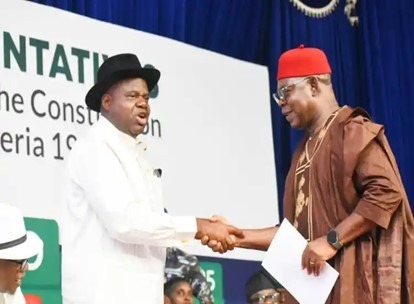
YENAGOA/Nigeria: Delta State Governor, Rt. Hon. Sheriff Oborevwori, has called for a sweeping overhaul of Nigeria’s 1999 Constitution, including an urgent upward review of the derivation formula, full local government autonomy, devolution of powers, and the creation of state police.
Speaking through his deputy, Sir Monday Onyeme, FCA, at the House of Representatives Public Hearing on the Constitution Review in Yenagoa, Bayelsa State, Governor Oborevwori stressed that the review process must lead to “a robust, people-oriented constitution,” which he said was fundamental to true federalism and national stability.
He described the public hearing as “a reflection of deep commitment to building a more inclusive, just and forward-looking Nigeria,” and commended the Committee’s effort in reaching citizens across different regions.
Governor Oborevwori reaffirmed Delta State’s support for constitutional changes that would promote equity, justice, good governance, and sustainable development. He presented eight major proposals on behalf of the state.
He first advocated for resource control and fiscal federalism, calling for a significant upward review of the derivation formula to ensure that more of the revenue generated from oil-producing areas remains with those states. He insisted the same principle should apply to states with solid mineral resources.
He also demanded a more equitable and transparent revenue allocation system that factors in the contribution, needs, and challenges of each federating unit, alongside constitutional guarantees for host communities to benefit directly from natural resources and mandatory environmental remediation provisions.
Governor Oborevwori urged the removal of maritime matters from the Exclusive Legislative List to the Concurrent List. According to him, granting states the power to legislate on maritime issues would unlock economic opportunities along the coastline, attract investments in the blue economy, enhance security, and improve environmental management.
He reaffirmed Delta State’s strong support for full administrative and financial autonomy for local governments, stressing that empowered LGAs are critical for rural development and essential service delivery.
Backing the creation of state police, the governor argued that decentralizing policing would enhance intelligence gathering, build trust with communities, improve response to security threats, and complement federal security agencies.
Governor Oborevwori also called for the devolution of powers across sectors such as transportation, energy, environment, taxation, and education, which he said would make governance more efficient and responsive to local needs while fostering innovation and development.
On environmental justice, the Governor demanded constitutional guarantees for a clean and healthy environment, legally binding obligations on oil companies to clean up polluted areas, and mechanisms to hold polluters accountable and compensate affected communities.
He advocated for judicial reforms aimed at strengthening the independence of the judiciary, ensuring timely access to justice, and upholding the rule of law—all crucial to national unity and investor confidence.
Concluding his address, Governor Oborevwori emphasized the need for transparency in the review and implementation of the constitution, with clear timelines, institutional safeguards, and interpretive guidelines to protect the spirit of justice and equity.
“This constitutional review offers a historic opportunity to reset our constitutional foundations in line with the aspirations of all Nigerians,” he said.
Bayelsa State Governor, Senator Douye Diri, also lent his voice to the call for greater regional autonomy, stating that resources should be managed by the people of the regions where they are found, with taxes remitted to the federal government.
Chairman of the South South Centre A of the House Committee on Constitution Review, Rt. Hon. Julius Ihonvbere, said the hearing was a chance for the people of the South South to make their voices heard in shaping the new constitution.
